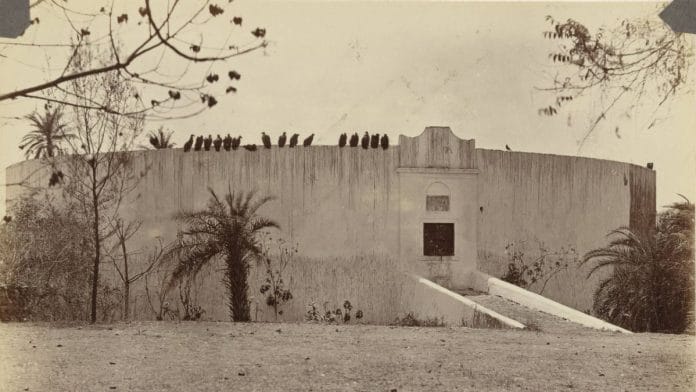New Delhi: The Supreme Court Friday approved the agreement reached between the Centre and Parsi community on the protocol and standard operating procedure for handling of dead bodies of Parsi Zoroastrian COVID-19 victims under which a metallic net will be installed in ‘Tower of Silence’ to avoid any contact of birds and animals.
A bench of Justices DY Chandrachud and Surya Kant noted the agreement which has been reached between the Centre and Surat Parsi Panchayat Board and disposed of an appeal against the Gujarat High Court order. The agreed protocol said, “Since the principal mode of disposal at the Tower of Silence is through strong and powerful rays of the Sun, and hence to deal with the problem of birds of prey, the Petitioner undertakes to install as soon as possible, a metallic bird net over Dokhma-No 3 – which is exclusively reserved for the dead Parsi COVID-19 victims; this will eliminate contact with birds and animals and will avoid any intrusion by vultures. Hence, there will be no exposure of the body to birds, etc. once the metallic net gets installed over Dokhma-No 3”. The bench appreciated the efforts of Solicitor General Tushar Mehta, appearing for the Centre and Senior advocate Fali S Nariman for an amicable settlement of the dispute.
A joint note submitted to the court said that the dead bodies of the Parsi Zoroastrians who died of Covid will be brought to the funeral parlour in the Tower of Silence complex and will only be handled by the professional Corpse bearers who have been professionally employed by the Panchayats. “The corpse bearers are and will continue to be fully vaccinated and their temperatures duly recorded before every funeral and carrying out procedures of handling dead bodies as per existing COVID guidelines”, the note said.
It said that neither relatives nor friends are permitted nor will be permitted to touch the dead body and it will be ensured that they will always remain beyond 10 feet from the dead body.
“The Nassasalars (pallbearers), at all times, while handling the dead body of the Parsi Zoroastrian COVID-19 victim will wear the PPE kit, gloves, face shield and N – 95 mask and the Govt of India regulations pertaining to dead bodies of COVID-19 victims having been read and explained to them and they will be cautioned to follow the directives of the Government of India”, the note said, which had a slew of other protocols to be maintained.
Mehta said that as agreed these protocols will be followed across the country by the community members.
On January 17, the top court had asked the Centre that it may consider tweaking the protocols for the burial of dead bodies of COVID-19 victims in a way that essential tenets of the Zoroastrian belief are also taken care of.
“The petitioners (Parsi community board) have suggested a protocol. You can see from the protocol that if any things need to be added then additional safeguards can be put and take into account the concerns of the community”, the bench had said.
It had added that the Centre has a genuine concern on account of public health and public well-being but let there be an exchange of ideas and explore if anything could be found moving forward.
Earlier, the Centre in its affidavit had said that the Ministry of Health and Family Welfare, in consultation with Indian Council for Medical Research (ICMR), has issued guidelines for the disposal of dead bodies of Covid positive persons.
“The basic element of these guidelines is that the dead body will be fully covered and not exposed so that people who are handling the dead body, which may or may not include family members, must not come in contact with bodily fluids or secretions. Coronavirus, according to scientific evidence that has emerged so far, can survive on a dead body, in bodily fluids, secretions, and moist cells of the dead body for up to nine days”, it said.
“The guidance by the WHO also makes recommendations for the disposal of dead bodies of COVID-19 patients by cremation or burial alone”, it said, that the dead bodies of such infectious patients are likely to get exposed to the environment and animals, if not buried or cremated properly.
In its plea, the Surat Parsi Panchayat Board had sought to protect the fundamental right to perform the last rites of the community members, who died of Covid, in accordance with the tradition of Dokhamanshini and not cremation, as has been directed by the authorities in view of the pandemic.
In the Dokhamanshini tradition, the body is kept at a height on a structure referred to as a well or the tower of silence, to be eaten by vultures, and the remains are left to decompose under the sun, it was stated.
On January 10, the top court had sought the assistance of the Solicitor General to find an amicable solution in resolving the grievances of the Parsi community, which is unable to perform the traditional burial of its members who died of COVID-19.
The appeal filed by the Surat Parsi Panchayat Board has challenged a July 23, last year order of the Gujarat High Court, dismissing its plea that sought permission to perform the last rites of the community members, who died of COVID-19, in accordance with the Zoroastrian traditions, instead of cremating them.
The petition before the high court had stated that the Parsi community was compelled by the authorities to opt for cremation or burial of its deceased members, “as against its religious practice and sentiments”.
This report is auto-generated from PTI news service. ThePrint holds no responsibility for its content.
Also read: Modi govt says no to Parsi demand for Covid last rites exemption, over ‘concern of virus spread’






